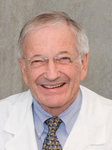 Dr. Anthony Nesburn’s own experience with cataracts
Dr. Anthony Nesburn’s own experience with cataracts
When it came time for cataract surgery on his own eyes, DEF Medical Director Dr. Anthony Nesburn wanted to be asleep. I didn’t want to hear what they were saying; I didn’t want to know if anything was going wrong. I told them, Put me out, and wake me when it’s over! he recalls with a characteristic laugh. The anesthesiologist worked hard to convince him full anesthesia was unnecessary. Ultimately, the twilight sleep they induced was sufficient, as Nesburn has no recollection of the actual procedure on either of his eyes. It was pain-free, and I was already seeing well in the recovery room, he says.
Nesburn had always been near-sighted; he needed his bifocals to see in the distance and read as he went about his day. After the surgery, he could drive, read reasonably sized print and work at his computer all without glasses. It was a vast improvement: Before the surgery, he was struggling to read small print and having real difficulty driving at night.
Still, Nesburn had put the surgery off. I performed cataract surgery for more than 35 years, so I know everything that can possibly go wrong, he says. For 98 percent of people, there is no problem, but I worried I’d be in the 2 percent! If a complication was going to happen, I figured it would happen to me!
The experience gave Nesburn a new level of empathy for his patients. Until you are the one there lying on the gurney, it’s hard to understand, he confesses. I really waited as long as I could to undergo the surgery, but now I’m advising patients to go ahead as soon as they have trouble with their vision. It has made a huge difference in my life.
It’s natural for any of us, when we have surgery involving our eyes and vision, to have anxiety, he says. Part of the surgery is informed consent: You can lose your vision having cataract surgery. It’s like lightening striking, but it can happen. I was concerned about the pain and the post-operative course and many things. But it was just so easy, and it really made a change in my satisfaction in daily activities: reading the paper, seeing the television, driving, doing everything. It’s just much, much better.
Deciding if and when to have cataract surgery is a very personal decision it’s based on what each person needs or wants to see, Nesburn says. I ask my patients, Is the blurring of vision interfering with your work, enjoyment of life or safety?’ If the answer is yes, they should seriously consider surgery.

